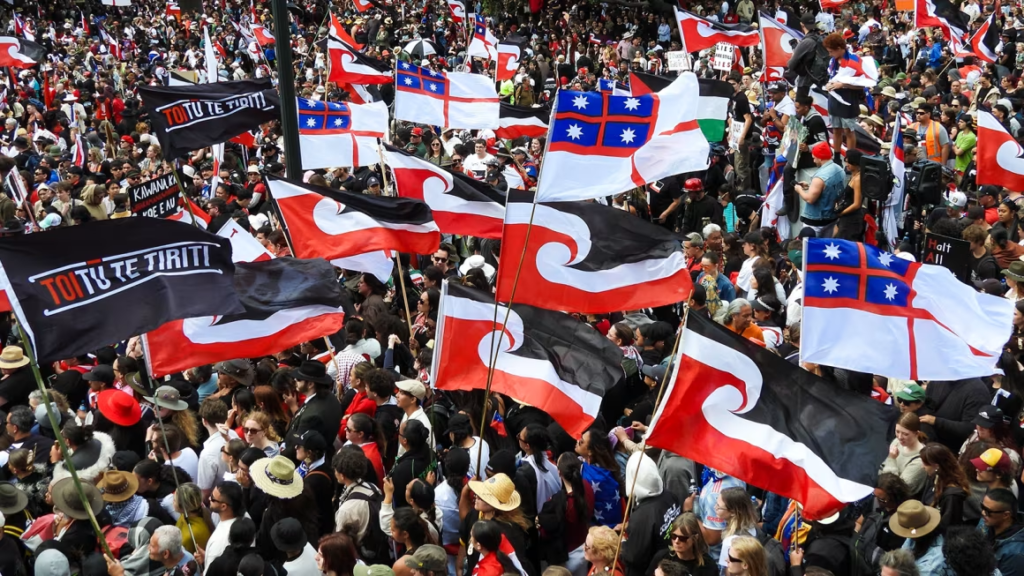Controversial initiatives against Maori have been rising in New Zealand, leading to concerns. The government has taken several initiatives that have gone against the Maori — an ethnic group that consists of around 18 percent — in New Zealand. According to multiple sources including the BBC and CNN, the government has made a move to amend the Treaty of Waitangi, New Zealand’s founding document, in 2024 and suspended three Maori MPs (the members of the parliament) over intimidating haka, leading to protests and growing concerns. Discrimination against Māori in New Zealand is not new and is a complex issue with roots in historical and ongoing socio-economic disparities. Though government policies that some believe undermine the rights and self-determination of Maori people, it remains unclear how much these are remarkable and whether discrimination will be addressed.
From the Māori viewpoint, several initiatives, including the above-noted initiatives, are deeply concerning and represent discrimination and a setback in the progress toward equity and reconciliation. However, some argue that these changes are necessary to ensure all New Zealanders are treated equally under the law and move away from what they see as race-based policies. Probably, though discriminatory initiatives are not as remarkable as said, various reasons are responsible for the growing initiatives and discrimination against the Maori people. But, among the reasons, a resurgence of anti-Māori sentiment, unresolved issues and the attitude of Christopher Luxon’s center-right government have probably now been playing a vital role in controversial initiatives in New Zealand, where there are several ethnic groups including the European, Māori, Asian and Pacific peoples.
But, positively saying, New Zealand has made strides in addressing the discriminatory issues and promoting Māori rights, leading to improved conditions for Maori people on different grounds including land and resources. The current government of New Zealand is also not decisively against the rights of the Maori people, the second-largest ethnic group, though it made some controversial decisions. Pertinently saying, the government has not moved forward with the proposed amendment to the Treaty of Waitangi — the 1840 pact signed between the British Crown and Māori leaders that establishes and guides the relationship between the Government of New Zealand and Māori people — after the protest of more than forty thousand Maori people in the Capital last year.

Photo credit: https://edition.cnn.com/.
But there are various flaws and challenges, leading to a rise in discrimination against Maori people in various forms, though the government has addressed the impacts of colonization in terms of the systematic dispossession of Māori from land and resources, along with economic disadvantage. Insufficient government actions to protect rights and the lack of consultation with the Maori people are crucial flaws that lead to discrimination against Maori. Notably, the proposed Treaty Principles Bill, which was introduced in the parliament by the ACT New Zealand party and passed in the first reading, was criticized for not involving Māori in its development. Among others, there is a criticism of the lack of empathy for the Maori people.
Addressing the discrimination and the reasoned concerns of the Maori people in New Zealand is vital. But it is also vital to ensure that Māori rights do not deprive others’ rights — including the rights of other minority groups in New Zealand. For this, the government needs to take the rights of all ethnic groups including the Maori in making laws and policies. The consultation with the ethnic groups including the Maori people will be helpful for the government not only in making and/or amending relevant laws but also in addressing their concerns and reducing their grievances.
But the promotion of tolerance among different ethnic groups is vital in New Zealand, one of the most peaceful countries all over the world. Pertinently saying, there are negative stereotypes about Māori such as “troublemakers,” “lazy” and “unintelligent” that influence public perception of the ethnic group and contribute to discriminatory practices and behaviors. Improved tolerance will help reduce discriminatory attitudes toward ethnic groups especially the Maori people.
Amir M Sayem
Chief Editor
Dhaka Opinion Magazine
